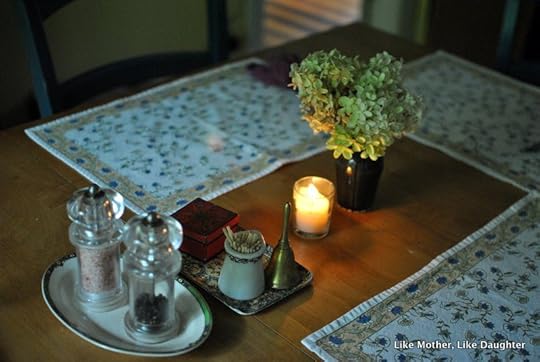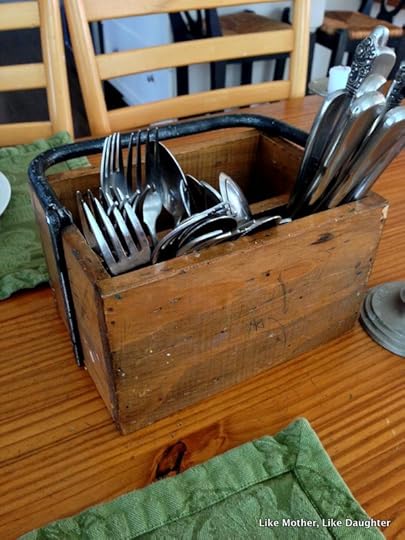The secret to planning menus.
Ask Auntie Leila!

We’ll start with a reader’s question and then I will tell you the secret that will set you on your way to success in homemaking.
Dear Auntie Leila:
I’m a new reader to your blog and LOVE it. Pardon me if you’ve addressed something like this before and I haven’t gotten to it. I feel like I could keep your “Ask Auntie Leila” section in business for a long time to come, but since I’m currently trying to sit down and figure out what to feed my family, I’ll start there.
I loved your posts on “Dinner Every Day” but I can’t really get past the step of making a huge list of potential meals. My husband and kids aren’t much help. My kids, five years old and under, can’t tell me what they want to eat because their likes and dislikes seem to change from day to day! My husband says, “Make what you want!” I feel paralyzed when I sit down to think about it. I don’t like being in the kitchen anyway, so the thought of all the time I’ll be spending making this stuff AND THEN CLEANING IT ALL UP is depressing, to say the least.
Then the dilemma of what to make? Should I stick with fun and delicious, but decidedly not-healthy things? Grandma’s Jello fluff salad? Chicken/cream cheese pockets made with Pillsbury crescent roll dough? Nigella’s pasta? Or then there’s that diet plan I’d theoretically like to follow, to lose the last little bit of baby weight (or since I’m newly pregnant, to keep from gaining my usual 60 lbs).
Then there comes the question of will my kids even eat what I fix? If I make something they like one day, they’ll turn up their noses the next day, or one child will love it and the rest won’t touch it, which definitely adds some unpleasantness to our mealtimes. Or then there’s the health angle to consider — am I struggling with anxiety, depression, and exhaustion because I’m gluten/dairy/soy/sugar/food-intolerant and don’t know it? (Or is it just because I’m a constantly nursing or pregnant mom [sometimes both] and life is hard!) I used to eat anything, all the time, and it didn’t make me anxious. In fact, it was rather enjoyable. Should I be drinking kombucha and kefir and making my own homemade bone broth and fermented sauerkraut? Would that magically make me a new person?
And then don’t even get me started on the budget side of groceries. Yes, we are very poor and the less we spend on food, the better — but since sticking to a tight budget seems so impossible, we don’t even try! My husband says, “Spend what you need to!” and I take him up on it because why stress myself! Even though it still stresses me because I know we’re spending too much! Auuuggggh!!
Help!
Love,
Frazzled
Dear Frazzled — and all of you out there who KNOW you should be making menus, however simple (also known as planning what you will eat for at least a week so that you are not spending all day staring at a package of ground beef and wanting to run away to a circus or convent or anywhere where they will just plunk a plate in front of YOU) –
Dear Reader who needs help overcoming this obstacle to the first step of a life of peace and order, this step which is making the damn menus!
The secret that the French and the Finns and all the other cultures with which we are daily browbeaten, who are so superior to us and never feel overwhelmed by the necessity of feeding their families:
First and foremost, the secret:
Every person in the house must be polite and respectful and grateful for whatever food they are served.
If they don’t like it, that’s okay. Lots of people don’t like lots of things. They can even let you know what their preferences are. But it must all be done kindly and with courtesy.
Talk to your husband about training the children to speak respectfully to you about the food. It will require both of you, but you can do it. It won’t happen on its own. Training must occur and you must do the training. It will take time and not happen overnight.
But one day you will realize that it’s a pleasure and not the burdensome task you imagine to plan your menus (relatively speaking) because it’s a pleasure to sit down and eat with your family.
How to bring this impossible state of affairs about? Auntie Leila will take you through the steps.
1. Talk to them beforehand about what they are and are not allowed to say. Begin by saying, “We don’t say that about the food.” Work up to making it clear that if ONE WORD that is not polite comes out of their mouth — “Oh gross.” “Yuck!” “I hate this!” “I’m not eating this!” etc. — they will leave the room. You will know when enough is enough.
I would not threaten loss of dessert. We are trying to cultivate true enjoyment here (see #4). Simultaneously, give them the exact script that you want to hear from them. “This looks delicious.” “Thank you, Mama.” “I like the [mention something they do like here]” “You are a good cook, Mama.” “Don’t worry about the burned green beans, Mama, it’s okay.” (This last one often has to be said to me, for some reason.)
An option: SILENCE.

2. Surround your meals with ritual. Whether, as sometimes happens, you feed the children first or they are sitting with you at supper, and no matter how simple the meal, have the table set beforehand (note I do not say YOU set it beforehand — distribute tasks as necessary and possible). Light a candle.
Teach them not to eat until Mama has sat down. Daddy has to do this. He must wait for his beloved wife to collect herself. Of course, he has pitched in with the prep and then sat down himself to model patient waiting. When Mama sits, he leads grace.
For a ritual to occur, you must be prepared. It’s up to you to realize that every single day you actually will need a drink, glasses, napkins, silverware, serving utensils, salt, pepper — a whole host of things! Instead of getting those items after everyone is seated as if visited by a daily revelation regarding these matters, think it through beforehand. Keep the things close to or on the table, possibly on a tray. Minimize fuss at the table by supplying what is necessary with forethought. Try not to be continually surprised by the things you need.
Even the other meals need a bit of ritual, appropriate to their lesser status, but still.
It’s not a feeding trough of beans, garnished with a couple of dead dogs, as Basil Fawlty says. It’s a meal.
If you take care of the details beforehand, you will notice that when you sit down and pray, there is peace. The agitation comes from jumping up, not being ready, and general disorder.

3. Every member of the family should bend over backwards to be sure that every other member is well supplied with what they need and also what they prefer. I have a friend who says that her father would take the sweet part of the watermelon on the grounds that he was the father. Well, this is not my experience of fatherhood, based on how my husband acts. He holds back and makes sure that I have what I like. If left to himself he takes the least appealing portions. He notices what the quantity of food is and how it will be distributed. I usually have to urge him to take the last bite — actually, I have to watch like a hawk lest all my family members leave at least what amounts to one small serving, no matter what the quantity of food has been, such is their consideration.
A priest friend, a monk from a large family, mentioned the principle of FHB — “Family Hold Back.” This means that when there are guests, the family already has awareness that something might run out, and so they hold back to be sure that the guests have enough. A simple principle of hospitality. This kind of courtesy comes with practice! Practice with each other.
Young children can be taught to jump up and get the butter or the marmalade. Rowdy boys can be encouraged to pick up someone’s dropped napkin. Older kids who aren’t absolutely riveted by the adults’ discussion of the latest world crisis can take the baby for a turn.

Here is my dear friend Emily’s solution to one of the tasks. This honestly never occurred to me, and likely won’t be possible when the family is larger and there are often extra people at the table, but I think it’s delightful. Later, another one can be added and they can be kept on a sideboard nearby.
4. Let’s enjoy the food, however humble it is. The issue with grumpy children — and I have written about this before — I know it isn’t the only issue, but it is a big one — is that we parents (and mothers in particular) are not feeling free to enjoy our meal and be confident that we did our best, however humble. We are hovering over our children with great anxiety that they a) eat enough to ward off expiration and b) affirm and approve of us. We somehow feel that our worth as parents hinges on how they behave at the table, and yet we do not supply them with the proper behavior or even attitude. Thus, grumpiness occurs.
If someone truly does not like something, they can, if asked, answer, “It’s not my favorite.” That is the extent of the negativity! For instance, if offered more liver and onions (after their one bite which they must eat unless you know it’s a real aversion), the child may observe, “No, thank you, I’m full.” If pressed, he might say, “It’s not my favorite.” They can certainly have more of whatever else is offered. However, and see #3, they can’t hog the real delicacies, because that is rude.

5. When finished (and for a small child, this might be in 10 minutes), the cook should be thanked. “Thank you, Mama, for this nice meal.” When your husband thanks you, thank HIM for being a good provider. (Remember Ma and Pa? So gracious to each other, while eating corn pone and salt pork or some such starvation meal.)
At least implicitly, we should be thanking God all over again, and there are those who say a little grace after the meal as well. It can be as simple as “Thank you, dear Lord.” I remember my own father, who was not Christian, saying this prayer after the meal. You can go on sitting there and enjoying the food and conversation with whoever is left, that’s fine. See this post for how children leave the table and what is expected of them.
Wait, that’s one secret?
Yes. Having a culture of kindness and good manners. I’m just telling you HOW to get that culture.
Once you institute this culture or feed it if you already possess it, you will find that you feel much more free to plan your meals.
You won’t worry as much about who will or will not like what you decide on. Since with my method you are consulting your family (or observing them if they really aren’t forthcoming) and taking their preferences into account, your fairness with them meets with good will from them.
Only, you have to teach them that good will. I’m giving you a sketch — feel free to do it according to your own family style!
But warning: Do not fall into the trap of thinking that the family style is to have no manners. No way.
Once you plan your meals, you have an amazing amount of time and a lot of confidence quickly to take care of the other tasks that face you, including addressing the issue of getting kids to help.
And then your environment — which is the key to educating your children — is orderly and thus, open to wonder!
See?
Manners (kindness and courtesy) are the secret.
Yes, dear Frazzled, I think you will benefit if you read the menu posts one by one and try to internalize what I’m saying. You will really get things in order if you try to make some lists. You can probably make all the things you are dreaming of… one at a time. Let’s be patient with ourselves and you know what? It’s okay to ask the family to be patient with us too. Kindness and courtesy.

As to the children, read the post about picky eaters — lots more detail there. Keep what you feed them simple, making sure that you serve it up without looking for affirmation, but with a good amount of ritual and also help from them. I’ve written all about it.
One thing at a time. Worrying about it all at once is a good way not to succeed. Read my post about “competence vs. perfection” and think about how to establish a good rhythm in your day so that you know what to expect.
Most of all, let’s enjoy each other, the good food, and life.
Better is a dinner of herbs where love is, than a stalled ox and hatred therewith. ~ Proverbs 15:17



